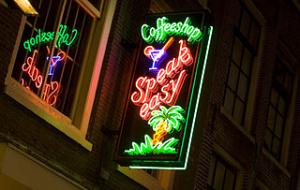Beginning in the mid-1980s, Holland was the world's marijuana mecca. Under the quite sensible policy of gedogen (pragmatic tolerance), Dutch authorities didn't quite legalize marijuana but instead effectively turned a blind eye, allowing licensed retail establishments -- the famous coffeeshops -- to sell five grams or less of marijuana, and to let their customers consume the products onsite despite prohibition remaining on the books.

Oh, the stoners still come for coffeeshops like the Bulldog and Die Melkweg, especially weekend punters from more puritanical locales, such as Britain and France, where weed can still get you in trouble. This is the "drug tourism" the Dutch decry even as they pocket the Euros.
But over the years, some of the luster has rubbed away, in part because conservative Dutch governments who were never happy with the coffeeshop scene whittled it down as much as they could, but also in part because the Dutch were standing still while the relaxation of marijuana prohibition gained momentum around the world.
Uruguay legalized it. Canada legalized it. Ten American states, the nation's capital, and two US territories legalized it, with another state or two or three likely to do it this year. And this was actual legalization, not the wink-wink-nudge-nudge "it's still illegal but we'll allow it" Dutch compromise. And while no European country has completely legalized it, decriminalization is afoot in broad swathes of the continent, and Spain allows private use and cultivation, as well as "cannabis clubs," especially in Catalonia.
Now, though, the Dutch are finally considering taking the next step, and that involves fixing a chronic issue for their system: the "back door problem." That is, while it has been allowed for the coffeeshops to sell marijuana, they have had no legal source of supply. The Dutch system had no provision for the regulated provision of product to the coffeeshops. Instead, while coffeeshops could openly sell to their customers through the front door, their black market weed supplies had to sneak in the back door.
A halting and limited effort to rectify the situation is now about to get underway. The coalition government announced last week that it will move forward with a pilot program in regulated marijuana production for the coffeeshops. Under the plan, the government will issue licenses to 10 growers who will each have to produce at least 10 types of marijuana product, with THC content clearly marked on the packaging. A minimum of six and a maximum of 10 local authorities will take part in the trials, which will last four years, meaning that it will be up to the next government to decide whether the Netherlands will press ahead with state-regulated production.
But both the local authorities' association, VNG, and the government's highest advisory body, the Council of State, have already criticized the plan as too limited and stringent. The plan seeks to completely eliminate the black market as a source for coffeeshop product: "Coffeeshops in the municipalities which are taking part in the experiment can only sell legally-produced hemp products and growers can only sell to those shops," the plan says. "This means the entire chain will be closed."
The local authorities in the country's two largest cities, Amsterdam and Rotterdam, have complained that the goal is unworkable, especially in Amsterdam, where more than a hundred coffeeshops are doing brisk business. The Council of State, meanwhile, has complained that the pilot program is too small and will not allow useful conclusions to be drawn.
Still, the coalition government is moving forward with the plan and says it expects final decisions on which local authorities will be involved by the end of the year. The Netherlands is now poised to once again move into the marijuana vanguard with state-regulated commercial marijuana production, even if the government's plan is still half-baked. We will see in four years whether the country is ready to finally solve the "back door problem" and fully embrace the marijuana business.
This article was produced by Drug Reporter, a project of the Independent Media Institute.
This work by StoptheDrugWar.org is licensed under Creative Commons Attribution-ShareAlike 4.0 International
Add new comment